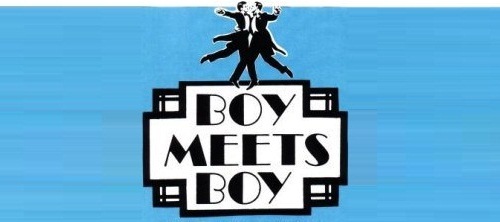Prologue)
For this show the traditional overture is replaced by a musical prologue, signalling the slight but very significant variation from conventional stories:
It is December 11, 1936; the place, London; the setting, the elegant Savoy Hotel.
Acte I
Casey O’Brien, world-famous reporter is throwing a two-day At-Home Party in Room 203. The morning after, he awakens to a hangover and bad news; his friend Andrew arrives to inform him that he has just slept through the story of the decade - the Abdication of King Edward VIII to marry “the woman I love”. They disagree with the ex-King’s priorities. Outside the church, Clarence preens before the waiting reporters and photographers. Actually. They care more about the other groom, whom none of them has ever seen.
On learning that Casey - crack reporter that he is - also is in the dark about the mysterious Guy Rose, the rival reporters describe him as the (imaginary) epitome of good looks and charm: The English Rose. The ruse works. Casey is immediately infatuated, and when the news arrives that Clarence has been jilted at the altar, he dashes off to seek the missing groom.
Back at the Savoy, Casey makes plans to discover the whereabouts of the English Rose and tries, without success, to rid himself of the plain, bespectacled young man who claims correctly, that he is Guy Rose, but fails to convince Casey. In an attempt to obtain an invitation to dinner, Guy is forced to pass himself off as a friend of the “real" Guy Rose who can help Casey in his search.
They visit several expensive restaurants where “Guy” might eat; the entertainers everywhere are singing about a topical and popular subject: Marry an American. But the English Rose is nowhere to be found. However, after a few bottles of champagne, Casey and Guy discover a mutual interest and reminisce about the joys of scouting.
Returning to the hotel, Guy tries to tell Casey the truth about himself, adding a declaration of love. But Casey has fallen asleep and does not hear. Next morning. Faced with a gigantic bill, Casey decides to delve deeper into the story of the English Rose. To prevent this, Guy promises to produce Casey’s dream that night at the West End's most fashionable night-spot, the Trocadero. Casey leaves. Helped by desperation. Love and the arrival of Casey’s tuxedo from the cleaners, Guy manages to transform himself into a glamorous man-about-town. The "new Guy" is a rousing success. Meeting him as arranged, Casey is immediately enamoured. But before the happy pair can elope to Paris, Clarence convinces Guy that he would be the ruination of Casey’s life and career. Act One ends with Guy renouncing Casey and Clarence triumphant.
Acte II
Act Two opens in a London Spanish bar with Casey drowning his sorrows in drink.
Clarence commiserates while hoping to catch Casey on the rebound. Meanwhile, Guy has fled to Paris, where his aunt, Josephine La Rose is appearing in "Les Folies de Paris”, the climax of which is a strip number featuring the boys of the chorus. Clarence appears backstage and tries to win Guy back by deceiving him about Casey. Disillusioned and bitter, Guy decides to replace the departing nude in the Folies show. At the news of Guy’s startling announcement, which makes the London papers, Andrew goads Casey into going to Paris to obtain an interview. The resulting encounter between Casey, Guy and Clarence results in Clarence’s re-assessment of himself. Having resolved to turn over a new leaf, he confesses his various plots and deceits to Casey; he adds that the handsome English Rose is also “the mouse with the glasses”. Dashing back to the theatre, Casey arrives on stage just in time to prevent Guy from revealing his all.
The two are touchingly reunited. With newspaper headlines proclaiming two major June weddings - “Duke Marries Mrs. Simpson, O’Brien marries English Rose" - the cast assembles for a spectacular white wedding where Casey and Guy appear as figures atop a giant wedding cake.

.png)
.png)





